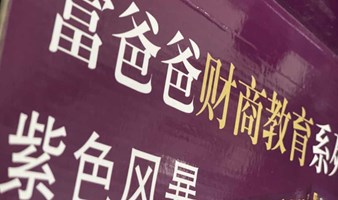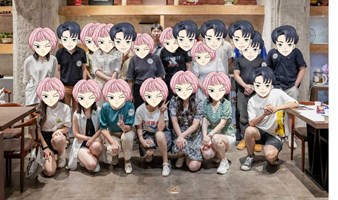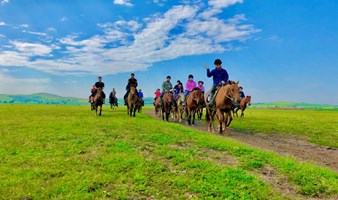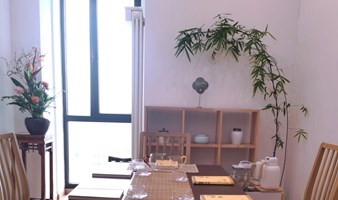

种植人生 Planting for Life 放映
收起
活动内容收起
种植人生 Planting for Life
中国China│ 2014 │ 75min│顾晓刚GU Xiao-gang
制片人:蒋显斌 Ben TSIANG
监制: 应启明 YING Qi-ming 张钊维 CHANG Chao-wei 陈玲珍 Ruby CHEN
导演:顾晓刚 GU Xiao-gang
执行制片:王雷军WANG Lei-jun
摄影:顾晓刚GU Xiao-gang
l 简介(短版):
都市白领老贾放弃城市生活,带着妻子回归田园,实践自然农法的种植。他的理念吸引了一批城市仰慕者,而当地的村民却不敢苟同。日出日落,夫妻逐渐失去了相濡以沫的情感,只剩下责任分工与义务,家庭与田园生活都面临了困境与裂痕。他们的故事里,有种子的培育,有生命的诞生,有稻谷的丰收,也有爱情的背叛,见证了人生的步履不停。
Old Jia was a white-collar worker who gave up his city life and returned to the countryside with his wife, Lizi. He abandoned chemical fertilizer to practice natural farming. His attitude and philosophy attracted a big group of admirers from the city, whereas local villagers found his approaches disagreeable. When Old Jia finally left and looked back this part of his life, he saw the germination of seeds, the birth of new life, the harvest of crops, and the betrayal of love. And as always, life goes on.
l 简介(长版):
影片讲述都市白领老贾放弃城市生活,来到上海的崇明岛,包下两百多亩地,回归田园,摒弃农药化肥,以自然农法为种植理念,吸引了妻子尚英与他一起来到农村,开始了自然的农耕生活。在食品安全问题诸多的当下,老贾回归农村的态度与独特的种植理念,吸引了一大批城市仰慕者,但当地村民对这种种植方法不敢苟同,有村民认为这是在浪费国家的粮食,特供给有钱人享用的食品。仰慕而来的人当中,包括许多年轻志工,以劳换食宿,大多对农村田园生活有一番美好的憧憬,但农村的孤寂、物质的落后使得老贾很难培育理念上的接班人。老贾潜移默化地把妻子当成自己的接班人,两人的生活与工作交织,尚英发现当初为了爱情放弃城市生活跟随老贾来到农村,为之憧憬的夫妻生活不知为何已索然无味,渐渐失去了夫妻间的相濡以沫,换来更多是同事般的责任分工。两人在一次争吵中爆发了离婚风暴,而后在贾母的劝和下,甚至迎来了小宝宝的诞生,尚英和村子里的老阿姨们交谈期间发现,每一个在农村生活的女人都是在带孩子、工作、照顾家庭的苦忍中过下来的,既然农村中大多女人都是这样过一生的,尚英心理上得到平和,逐渐对命运现状开始认从。就在孩子出生不到半年,尚英发现老贾已和另外一名女性秘密交往了三年。老贾离开了农场,此时尚英的父亲却又不幸离开人世,生命里最重要的两个男人皆离她而去。回首这段夫唱妇随的田园时光里,有种子的培育、有生命的诞生、有稻谷的丰收,也有爱情的背叛,最后还有人生的步履不停。
Some years ago, white-collar worker Lao Jia left metropolitan Shanghai to live on the idyllic Chongming Island. He contracted, more than 200 acres of land, adopting “natural farming” to grow crops without using any chemical pesticides or fertilizers. His wife Li Zi, persuaded, followed along to begin a new life surrounded by nature with him. Problems about food safety are many. Lao Jia had therefore attracted crowds of urban followers for his “back to rural villages” ideal and unique farming concepts. Local farmers disagreed, however. Some said he wasting this country’s food, because he was only growing crops affordable by the wealthy. Of his followers, many are young volunteers who worked for him in exchange of accommodation. They had all dreamed about a wonderful village life, but were soon disappointed by solitude, which they are not used to, and lack of material pleasure as they arrived on the farm. Hence it was difficult for Lao Jia to train any youngster to be his successor, and he eventually took his wife as his sole farming disciple. They lived and worked closely together, but Li Zi realized at a later stage that, no matter she gave up on a city life to come to this village with her love, her marriage life had become anything but a happy one. The couple no longer supported each other out of romantic love, but shared the work more like just ordinary co-workers. One day, during a fight, they spoke of divorce. Lao Jia’s mother succeeded in persuading them to stay together; they even had a baby afterwards. Then, on another day, Li Zi had a conversation with some old village ladies. She learned that all of them had lived through the hardships she was living through. They raised their children on their own, farmed and worked, and tried
hard to keep the family together. Li Zi finally felt peace of mind through this conversation, since most of the village women share the same fate. She started to accept her circumstances.
Just when the child was almost six months old, Li Zi found out that Lao Jia had been secreting dating another woman for the last three years. Lao Jia then left the farm, and Li Zi’s father also died unfortunately. Now that the two most important men in her life had left, it dawned on Li Zi that life is an ongoing journey. There were times when she happily followed Lao Jia on the farm. They planted seeds and seedlings grew. They harvested rice together, but Lao Jiao had long betrayed her when it comes to love.
●导演简介 About the Director
顾晓刚,1988 年出生于江苏省江阴市,五岁迁往浙江省杭州富阳市,现居北京。2012 年毕业
于浙江理工大学服装设计与营销专业,爱好绘画、电影等艺术,大二期间因参加创业大赛得
奖而注册过公司,追寻过一段宗教之路,大三逐渐迷恋上电影,想办法自学电影,跑过中国
美术学院旁听,之后开始独立影像创作,拍摄纪录片、广告、剧情短片。
Gu Xiao-gang, born in Jiangyin City, Jiangsu Province in 1988. Moved to
Fuyang City, Zhejiang Province at age 5. Graduated from Zhejiang Sci-Tech
University specializing in fashion design and marketing in 2012. Loves painting,
cinema and various other types of art. Won in join an entrepreneur’s competition
in second year of college, so founded and registered a company. Pursued religious
truths for some time. Became fascinated by film in third year of college and tried
to learn to make it himself. Was a guest student at the China Academy of Art
before starting to make independent films. Has made several documentaries,
commercials and drama shorts. Major early works include Bhakta and Even If
You Walk and Walk. Has continued to make films since then. Lives in Beijing
now.
●纪录片代表作品 Selected Filmography
2012 《种植人生》Planting for Life
入选CNEX2013主题征案
Selected for the 2013 CNEX annual thematic production
入选第四届杭州亚洲青年影展「亚洲之光」竞赛单元
Selected for the Shine Asia Award, 4th Hangzhou Asian Film Festival (HAFF)
入围第九届北京独立影像展
Selected for the 9th Beijing Independent Film Festival
2011 《信仰者》Bhakta
入选第三届杭州亚洲青年影展 青年电影训练营
Selected for the talent campus, 3rd Hangzhou Asian Film Festival (HAFF)
入选第五届重庆民间映画交流展 阿比查邦大师班交流项目
Selected for Apichatpong Weerasethakul’s Master Class, 5th Chongqing
Independent Film and Video Festival (CIFVF)
l 导演的话
From the Director
老贾,我是在2011 年10月第一次接触他的。初遇是在晚上,他开车带着老婆尚英到马路上接我们。我们跟随他们来到了稻田,当时正在赶收稻谷,一辆亮着灯的红色收割机隆隆作响,稻田旁的水泥地晒着白天铺开的稻子,现在已经铺上了一层油布。这晚,需要有人看守稻子,在水泥地的两边搭好帐篷,我和朋友兴奋地应下这看稻子的活,同时老贾也在。夜深得看见一层层的雾气扑来,静得不可思议,升起一堆篝火,我们几个人聊了起来,开始了解老贾的过去,老贾又为何到了此地,柴是劈里啪啦地响。
拍摄至今已有三年,村子的阿姨们看我拿个机器跑田里,老会向我诉苦说,做农民就是卑贱的,做农民是苦的,像我们这些年轻人过来貌似是不成器的人,怎么也会选择来村里生活。她们常提在嘴边的话是:城里人想办法跑来农村,农村人拼命跑去城市;对城市人来说,这是一种生活的闲庭漫步,对农村人来说,这是一种命运的逆流而上。我问阿姨:「以后要是没人会种田了怎么办?」阿姨们也不知道说什么,虽然有人说:「没人种了最好。」我知道这是气话。而许多类似老贾的人,在慢慢重塑农民百年来的新形象,不免感到欣慰。他们有知识,有一定的文化,有很多理想主义,还不乏一腔热血,也有采菊东篱下的,老贾就是这类人中的旗手,加之在上海的独特地理,老贾回归农村的态度与种植理念吸引了一大批城市仰慕者,农场常有年轻志愿者慕名而来,以劳换食宿,体验农场生活;而与之相反的是,当地村民对这种种植方法实在不敢苟同,有村民指出这是在浪费国家的粮食,特供给有钱人享用的食品。说不行的是因为这里施了几十年的化肥农药,突然又回到过去老人们小时候的种植方式,让他们觉得是一
种退步,怎么又回到古代了,这让村子里生活的人费解。农村和农村的人,似乎总会成为我们剥削的地方,那里的人,那里的土,那里的水,那里的蔬菜⋯⋯几十年前,城里的人告诉他们种田是要用农药的;几十年后,又有人告诉他们农药是不好、过时的(虽然这个体系还没真正树立),我想他们永远摸不清头脑,虽然农民勤劳能干,劳作辛苦,得到的回报却很低,光种地是养活不了家的。所以老贾这类新农人的出现,会对农村带来一些新的气象、一些新的看法。老婆尚英为了爱情而放弃城市生活,跑到农村夫唱妇随,建立农村新家庭,也为老贾在这个农业圈子中注入了榜样的力量。不过就像影片中慢慢呈现的,两人生活与工作交织,尚英发现当初为了爱情放弃城市生活跟随老贾来到农村,为之憧憬的夫妻生活不知为何已索然无味,渐渐失去了夫妻间的相濡以沫,更多是同事般的责任分工,平日二人就很容易发生争吵,以为是性格使然,现今回首过去,其实认识老贾时,已经有另外一个女人进入了他们的生活,只是也许只有老贾自己知道。尚英虽然个性独立自强,对命运也有自己的主张,但她对爱情是抱有理想主义的,愿意去隐忍与等候,愿意把自己完全交给对方。我很动容的是在一次采访中,她说到:「阿姨在地里头种菜,我当时心里比较郁闷,因为我觉得我又要工作,又要做饭,挺郁闷的,我就问那些阿姨了,你们年轻的时候是怎么过日子的。每一个阿姨都跟我说,哇,苦死了,又要带小孩,又要做饭,又要劳动那。我听她们这么一讲,心里也平和了,我说那可能女人都这样吧,所以我就认命点吧。我说,好吧,既然你们以前也是如此辛苦的渡过青年、中年时期,那我也就这样吧。」最后老贾离开了农场,有些看过样片的朋友老是会问我对老贾怎么看,人生无常嘛,哪怕寄望得再多,命运都有自己的轨迹在发展,并没有多少权力把自己的内心形象强加在他人身上。而我真正感到哀伤的是,此时尚英的父亲却不幸离开人世,在此之前还算见上过一面,当生命里最重要的两个男人都离她而去,回首在这段夫唱妇随的田园时光里,有种子的培育,有生命的诞生,有稻谷的丰收,也有爱情的背叛,最后想到还有人生的步履不停,就释然了。
I met Lao Jiao for the first time in October of 2011. One evening, he and his wife Li Zi came to pick us up by car and took us to his rice field. His workers were busy harvesting the rice; a red reaper, with a bright light, made resounding noises as it worked. On a cemented open space by the field laid rice collected in the day. It was all covered in oilcloth then. Someone had to keep an eye on these harvests throughout the night; my friends and I didn’t hesitate to take up the task. We set up tents on both sides of the space and Lao Jia stayed with us. Late in the night, we saw mist rush toward
us like sea waves, and it was unbelievably quiet all around. We made fire and started to chat. We learned about Lao Jia’s life before he came here and why he decided to come. Wood kept cracking in the fire. It has been three years since we started filming. Those senior village ladies, seeing that I’m always filming in rice fields, start to tell
me about their hardships. They say that farmers belong to the low class, and that it is tough to be a farmer. They also say they don’t see why we would want to stay in a rural village, since we don’t look like the underachieved at all. They say that city people aspire to live in a village, and vice versa. But for city people, a rural life represents leisure. For villagers, going to the cities means defying fate. I asked the ladies what would happen if no one wants to farm anymore. They were speechless for a while. Then, someone uttered, “Well, that’d be great!” I know she was just being upset. I was actually happy to see people like Lao Jia slowly working to rebuild this century-old image of farmers. These people are knowledgeable and cultured enough to take up the task. Many of them are idealistic and passionate. Some even dream of living a hermit’s life. And Lao Jia is their leader. Because his location is near Shanghai, crowds of followers swarm in from the metropolis in appreciation of his “back to rural villages” ideal and unique farming concepts. Young volunteers can often be seen on his farm. Paying labor in exchange of food and accommodation, they have come to learn about agriculture. But locals can’t possible agree with them.
Some villagers say this is a waste of the country’s food, and that they are only growing things for the rich to enjoy. The villagers are opposed to their farming methods because they see it as a step back. After all, they have been using chemicals
for decades, and now these people want to resume those archaic methods applied when they were kids. This is almost unfathomable for them. In situations like this, it seems inevitable that villages and villagers get exploited by us, the city dwellers. Speaking of the people, land, water and vegetables there… Well, decades ago, city people told them to use chemicals to grow crops. Decades later, people come to tell them that chemicals are bad and out of date, although a truly chemical-free farming system has yet been established. I don’t think the villagers will ever get the idea. Farmers are diligent; they are hard working. But they don’t get what they deserve. They can’t even support their own families through farming alone. “New farmers” like Lao Jia have indeed helped to “renew” those old agricultural villages for they contribute new thoughts about agriculture. Together with his wife, Li Zi, who gave up on an urban life to live with her love in the countryside and establish a rural family, Lao Jia becomes an exemplary figure among the new farmers. But, just like the film shows, as the couple lives and works closely together, Li Zi feels that, no matter the effort, her marriage life has become nothing but a happy one. The couple no longer supports each other out of romantic love, but shares the work more like ordinary co-workers. Moreover, Li Zi used to think that they fight a lot because they are very different persons. Now that she looks back, she feels that maybe it’s all because Lao Jia was secretly dating another woman. But only Lao Jia knows the truth. Li Zi is more of an independent woman. She has rather strong ideas about how her life should be, but she is also kind of an idealist when it comes to love. She is willing to suffer, to wait, and to
dedicate herself entirely to her loved one. I was profoundly touched by her in one interview. She recalled, “Some old ladies were growing vegetables in the field. I was kind of melancholic those days, because I had to work in the field and cooked all the time. I was suffocated by life. I asked the ladies how their lives were like when they were younger. Everyone said it couldn’t be tougher. They also had to take care of kids, to cook, and to do hard labor. So I felt I was comforted. Maybe every woman lives the same way.’ Then I was able to accept my circumstances more. I said, ‘OK, since you have all lived through such hardships in youthful and mid-life years, I’d better let
things be.’”
Eventually, Lao Jia left the farm. Friends always ask me about my opinions of Lao Jia after they’ve seen the film. But life is full of unexpected twists and turns. No matter what you expect it to be, life develops itself as it wishes. Likewise, I think I have no right to expect someone to play the ideal role I expect him or her to play. What has truly saddened me is that Li Zi’s father passed away. We met once before his death. Now that the two most important men have left, Li Zi reviews this countryside period she spent with Lao Jia. They planted seeds together; their baby was born. Rice was harvested, and love was betrayed. But the moment she realizes that life is an ongoing journey, she feels she’s free again.














 Camera Stylo
Camera Stylo

















